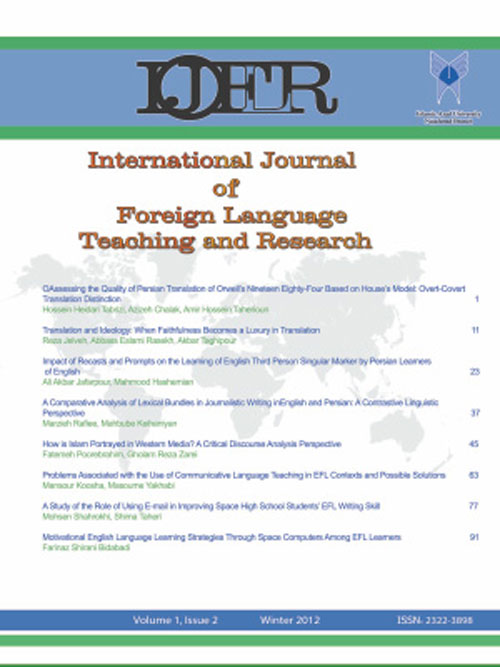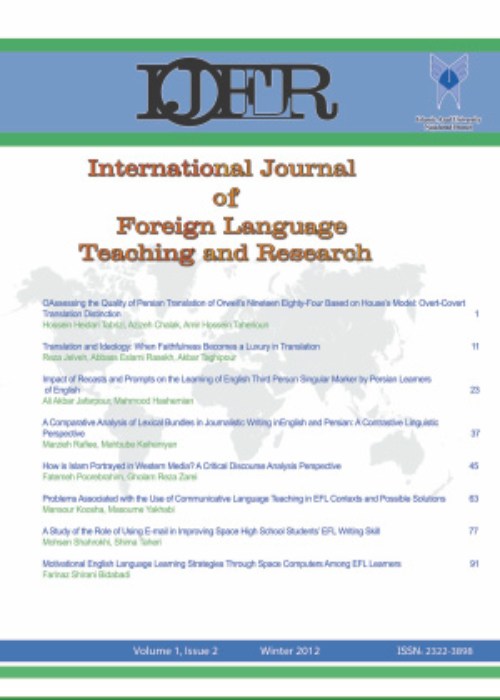فهرست مطالب

International Journal of Foreign Language Teaching and Research
Volume:4 Issue: 15, Autumn 2016
- تاریخ انتشار: 1395/08/02
- تعداد عناوین: 8
-
Pages 11-24This study was conducted with the objective of investigating the practice of teaching early reading comprehension. The study was carried out in sixty-six Grade 2 government primary schools found in SNNPR State in Gedeo zone,Ethiopia, in the academic year 2015. Sixty-six English language teachers were subjects of the study. The study employed mixed method, specifically QUANT-QUAL one. Data were collected using questionnaires, observation and interview. Sixty-six of the teachers (one teacher from each selected school) who were teaching English in Grade 2 completed the questionnaire. Ten of the teachers were observed while they were teaching reading to see how they were teaching reading and six of the teachers were interviewed. Data from questionnaires, classroom observations and interview were categorized and descriptively analyzed using frequency and percentage. The data were analyzed using both quantitative and qualitative methods. The findings revealed that teachers failed to implement the teaching of early reading according to the theories and principles of teaching early reading. Teachers were seen using inappropriate reading techniques and procedures in the mentioned grade level. The study also revealed that teachers are deficiently trained in phonological awareness, phonics instruction, comprehension, fluency and vocabulary.Keywords: early reading, practice of teaching early reading, poor readers, techniques, procedures, theories, principles
-
Pages 25-33The extent to which teachers written corrective feedback (WCF) is conducive to ESL learners improvement has been discussed since Truscotts claim in 1996. The mentioned debate continues because there has been lots of contrastive research studies with different results. This paper presents the results of a 2-month study of the effectiveness of WCF to 65 low intermediate Iranian learners. In the first phase, the students were divided into two groups of hedged group and control group, which received uncoded feedback. The learners produced 8 pieces of writing (Nelson Test was given to students to homogenize the groups). The first piece of writing was considered as the pretest and the 8th piece of their writing was considered as their posttest. Independent and paired sample t test were used to analyse the data statistically. The result of comparing the mean performance of the two groups in posttest indicated that the probability value was less than .05 (p = .000Keywords: feedback, uncoded feedback, indirect feedback, hedged form feedback, writing
-
Pages 35-49Recent interest in teaching thinking has lead different researchers to examine different approaches in education to find effective methods and approaches for teaching thinking. Through a qualitative case analysis, this study attempted to identify the effects of the infusion model of teaching thinking implemented through a dialogic approach on a PhD candidates critical thinking skills. The study occurred over a semester in a PhD course which aimed at reviewing and discussing language teaching issues critically. A number of interactions and reflective journals produced by the participant during the course was analyzed qualitatively for finding different thinking abilities and elements. A number of thinking abilities and elements proposed by Paul and Nosich (1993) in a higher order thinking assessment model was used for analysis. Analysis of the interactions and reflective journals showed that the number of thinking abilities and elements increased over the course which was indicative of the effectiveness of the infusion model used through a dialogic teaching approach in developing critical thinking skills.Keywords: Critical thinking, dialogic teaching, infusion model, interactions, reflective journal
-
Pages 51-62This study investigated the validity of processability theory proposed by Pienemann (1998/2015) among Iranian EFL learners oral performance. The theory defines six procedural stages for learners in the process of second language acquisition. In order to conduct the study, 10 intermediate EFL learners were selected based on their performance on Oxford Placement Test. Then, they participated in five tasks; namely, interview, spot-the- difference task, picture description, picture identification and story-telling task. Their speech was recorded and then transcribed according to predetermined structures (i.e., interrogatives, word order, and negation) called target structures. The frequency of the occurrence of target structures was calculated based on the emergence criterion. The results showed that Iranian EFL learners produced language structures in the predicted procedural stages as proposed by processability theory. Thus, processability theory can be valid for Iranian EFL learners too.Keywords: second language acquisition, processability theory, task, oral performance
-
Pages 63-74This study focuses on realizations and discourse functions of the organizational linkers in the writing of research article abstracts from four disciplines. To this end, 120 research article abstracts from four disciplines namely, Applied Linguistics, Economics, Agriculture, and Applied Physics (30 from each discipline) were selected. All research article abstracts were extracted from empirical research articles published in international high impact journals. The corpus was analyzed adopting Gosden (1992) taxonomy. The most striking result is that the realizations and discourse functions of the organizational linkers, to a large extent, are guided by the nature of research article abstract and discipline. This result adds substantially to the comparative understanding of research article abstract writing across disciplines and evidences the need to tailor writing according to English for specific needs.Keywords: Organizational linkers, writing research article abstracts, discourse functions, disciplinary study
-
Pages 75-85The study aimed at investigating the efficacy of written corrective feedback (CF) in improving Iranian EFL learners grammatical accuracy. It compared the effects of focused and unfocused written CF on the learners grammatical accuracy. 75 EFL students formed a one control and two experimental groups. The focused feedback group was provided with error correction in tenses. The unfocused feedback group was provided with error correction in tense, articles, spelling, pronouns, vocabulary, and prepositions. The results indicated a significant improvement in accuracy for the two experimental groups from pretest to posttest. The outcomes demonstrated that giving written CF was effective, which enhanced learner's grammatical accuracy, and that focused and unfocused written CF were not of differential significant effect in such manner. The results on the construct of the attitudinal questionnaire indicated learners preference in two experimental groups for the interactional activities, error correction, and the different type of CF techniques. The mean scores on each content area of the questionnaire suggested that learners in the focused group scored higher than the other groups in their attitudes toward the errors to be corrected.Keywords: Grammatical Accuracy, Written Corrective Feedback (WCF), Focused Feedback, Unfocused Feedback, Attitude
-
Pages 87-98The present study was an attempt to investigate the effect of IT system-based instruction vs. traditional instruction of teaching English on Iranian low-intermediate EFL learners reading comprehension ability in a smart school in Tonekabon, Mazandaran, Iran. To collect the data, 60 low-intermediate high school learners took part in the study. As to the homogeneity of the participants, they took Solution Placement Test (SPT). The participants were divided into one experimental group (i.e. receiving the treatment in terms of using smart tools) and one control group (i.e. receiving no treatment and being traditionally taught through white board). A reading comprehension test (pre-test) was given to examine the participants initial knowledge of reading comprehension. Similar to the pre-test, a reading comprehension test (post-test) was utilized to check the participants performance of reading comprehension and look into their probable progress as a result of receiving the treatment. Findings revealed that the experimental group outperformed the control group after the treatment highlighting the success of instruction in enhancing the students reading comprehension ability. The results suggest the application of smart tools to promote interaction among the learners and assist them to freely express their thoughts in the e-learning environment.Keywords: IT system, based instruction, reading comprehension ability, EFL
-
Pages 99-115Reading strategies are seen as supportive means to help learners process and comprehend English texts effectively. The present research probed to posit a discipline-specific model of reading strategies for Iranian TEFL postgraduate students. The motive behind developing a local model of reading strategy is twofold: first, a variety of postgraduate students admitted for M.A and Ph.D. programs, either may not have received their first degrees in TEFL or they are TEFL graduates who lag behind disciplinary-knowledge in terms of reading. Consequently, Twenty- eight postgraduate students majoring in English Language Teaching from Shiraz University, Isfahan University, Yazd University and Islamic Azad university of Bandar-Abbas wherein M.A and Ph.D. programs in TEFL are offered were asked to brainstorm their ideas as to how they approach technical materials in English. Conducting a 3-session semi-structured interview with 22 participants and focus-group interviews with six participants, the researchers then transcribed and codified the data according to Corbin and Strauss (2014) systematic steps of open, axial and selective coding for grounded theory. The findings revealed a six factor model encompassing 32 categories. The factors include: a) previewing the content, b) recognition of the salient and pronounced features, C) emphasis and clarification upon the significant features, d) consulting auxiliary sources, e) ruminating and reflecting upon the text, and f) reviewing the gist of materials. As a matter of fact, the proposed model can help postgraduate students move away from teacher authority and develop reading autonomy.Keywords: Reading strategies, Discipline, specific reading strategies, Semi, structured interview, Grounded Theory, Focus, group interviews


